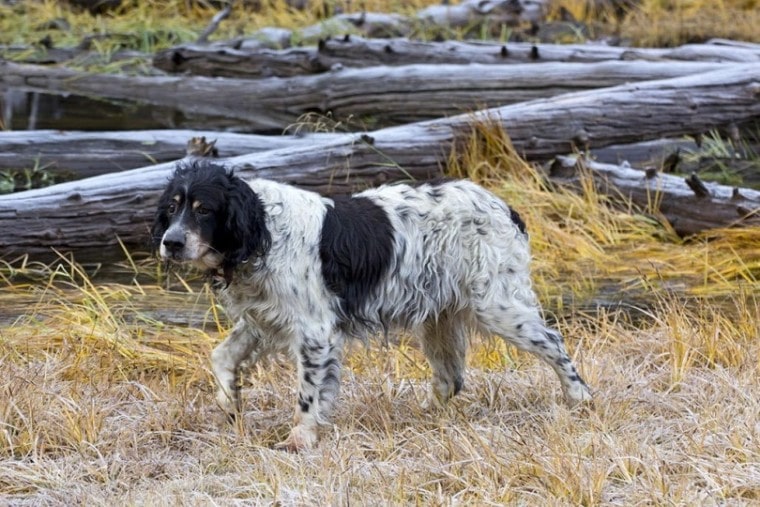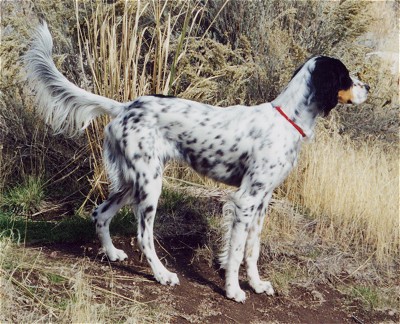
Click Below to Skip Ahead
The Llewellin Setter is an attractive, energetic dog that is a source of contention within the dog world. Some people believe these dogs are English Setters, while others believe they are an individual, distinct breed. Llewellin Setters are descendants of dogs bred by a man named Edward Laverack. R. Purcell Llewellin outcrossed Laverack’s best dogs from his breeding program, leading to the Llewellin Setter. Those that believe these dogs are English Setters feel that Llewellin Setters are simply a specific breeding line of English Setters.
Breed Overview
Height:
20–27 inches
Weight:
35–65 pounds
Lifespan:
10–12 years
Colors:
Blue, chestnut, lemon, liver, orange, white, black; bicolor, tricolor, Belton
Suitable for:
Hunting, active homes, large fenced yards, experienced dog owners
Temperament:
Energetic, stubborn, intelligent, mischievous, curious, people-oriented, enthusiastic, gentle
Regardless of whether or not these dogs are a distinct breed, they are excellent dogs, especially in high energy or hunting homes. They are busy dogs and love having a job or specific activities to do. Their stubborn nature can make them difficult to train and they are best for dog owners with experience training stubborn dogs. Their strong-willed personalities can make them complex, but they are gentle, people-oriented dogs.
Llewellin Setter Characteristics
Llewellin Setter Puppies
Llewellin Setter puppies are generally energetic and friendly dogs, with a strong instinct to hunt and retrieve. They have a long and silky coat, which is usually liver and white in color. The Llewellin Setter is a highly prized breed by hunters, but can also make great family pets for those willing to provide them with plenty of exercise and outdoor activity.
It is important to provide them with plenty of exercise and outdoor activity to satisfy their high energy levels. A daily walk or jog, along with opportunities to run and play, will help keep them physically and mentally stimulated. It is also important to provide regular grooming to maintain their long and silky coat. This may include brushing, bathing, and trimming. Proper training and socialization can help prevent behavioral issues and promote good manners in the home.
Temperament & Intelligence of the Llewellin Setter
Are These Dogs Good for Families? 👪
Llewellin Setters make excellent family dogs, especially in active households. They tend to be very gentle and are often highly tolerant of children. Active families who participate in activities like hunting, hiking, and sports, can be a great match for a Llewellin Setter. In families that participate in fewer activities, a Llewellin Setter will need a fenced yard, daily playtime, and daily walks or runs. These dogs do not like to be left alone for extended periods of time, so families that participate in a lot of activities that the dog cannot join in on, like children’s sports games, may not be a good fit.
Does This Breed Get Along With Other Pets?
Care should be taken when introducing Llewellin Setters to small animals, including cats, guinea pigs, birds, reptiles, and even small dogs. Llewellin Setters have a high prey drive that could lead to them chasing or injuring smaller animals. They are usually great with other dogs, especially dogs that are close to their own size. Slow introductions are a must to ensure everyone gets along. This is especially important with Llewellin Setter puppies to help them gain confidence and trust.
Things to Know When Owning a Llewellin Setter:
Food & Diet Requirements 🦴
Llewellin Setters don’t have any specific food needs, but if your dog is participating in hunting, sports, or moderate to heavy activity daily, then you should ensure they receive enough calories to stay a healthy weight. Avoid overfeeding, though, as obesity can put unnecessary strain on the joints and can shorten your dog’s life expectancy. Your veterinarian can provide guidance on what and how much to feed your Llewellin Setter.
Exercise 🐕
Daily exercise for your Llewellin Setter is a must. These dogs can become neurotic, nervous, and badly behaved without proper exercise and socialization. Finding daily activities you can do with your dog, like walks, jogs, sports, and games, can help build trust between you and help your dog burn excess energy. If your Llewellin Setter begins exhibiting destructive behaviors, nervousness, or separation anxiety, have them checked by your vet first to rule out medical problems, and if they are medically cleared, consider increasing their daily exercise regimen.
Training 🎾
These dogs will make you work for their training! They are strong-willed and stubborn, which can make them exceptionally difficult to train. Training a Llewellin Setter is not for new dog owners or people who don’t have experience training their own dog. Even training basic obedience can be difficult, especially since these dogs tend to stay puppy-like most of their life.
Be prepared to use high value rewards and lots of positive reinforcement to train your Llewellin Setter. Find the items or treats your dog views as highest value. This can be a toy, specific treat or food item, or any other item your dog views as high value. High value rewards are motivating to dogs, even stubborn dogs, especially when they realize they do not receive the reward by doing the wrong thing. The key to training a Llewellin Setter is consistency and patience.
Grooming ✂️
Llewellin Setters have long, straight to wavy hair that should be brushed multiple times per week, if not daily, to prevent knots and mats. Dogs that spend a lot of time outdoors, especially hiking or hunting, are prone to picking up burrs, thorns, sticks, leaves, and lots of other items. This may require extra grooming effort to get the coat clean, and these dogs may even require regular grooming visits to ensure their skin and coat stay healthy.
Health and Conditions 🏥
Male vs Female
Males tend to be agreeable, social, and more trainable than females. Females seem to have more strong-willed, independent personalities, which can make them more difficult to train. They also may be more intelligent than males, which causes them to be sneaky and organized when hunting. Males usually have more stamina and are often better hunting companions for long days in the field.
3 Little-Known Facts About the Llewellin Setter
1. There is a debate between whether this breed is a Llewellin Setter or English Setter
Since Llewellin Setters are from a specific bloodline, many people feel they are a separate breed from English Setters. However, Llewellin Setters can be AKC registered as English Setters. Llewellin Setters are not acknowledged by the AKC at this time. It is generally accepted that all Llewellin Setters are English Setters, but not all English Setters are Llewellin Setters.
2. Belton Llewellin Setters have a striking coat pattern
One of the most common marking patterns of Llewellin Setters is called “Belton”. Belton dogs are usually born solid white and develop color as they age. They will develop ticking but not large color patches, giving them a dappled appearance. Orange, chestnut, blue, liver, black, and lemon can all have bicolor or tricolor Belton markings.
3. A Llewellin Setter is a TV star
On the Outdoor Life Network (OLN), there is a show called “Hunting with Hank” that features a dog named Hank and his owner, Dez. The show focuses on Hank and Dez’s hunting and travel adventures. Hank is a Llewellin Setter.
Summary
Llewellin Setters are excellent dogs that make perfect hunting companions for people willing to put in the extra effort to train them. They are gentle, social, and sweet dogs, but they do require more care and training than the average home just looking for a pet is typically looking to put in. When it comes to hunting, especially birds, some consider Llewellin Setters to be the best of the best. They are driven and have strong hunting genes bred into them.
When choosing a Llewellin Setter, make sure to choose a reputable breeder who will give you a healthy dog with health guarantees. Responsible breeders perform OFA/PennHIP testing on dogs prior to breeding them to ensure they have healthy hips and elbows. This reduces the risk of passing hip or elbow dysplasia on to the offspring. Poorly bred Llewellin Setters may have health problems or behavioral problems that can be difficult to treat or care for, so always look for a good breeder or a rescue that will help match you with the perfect dog.
Featured Image Credit: Llewellin Setter_Ginger-Livingston-Sanders, Shutterstock








